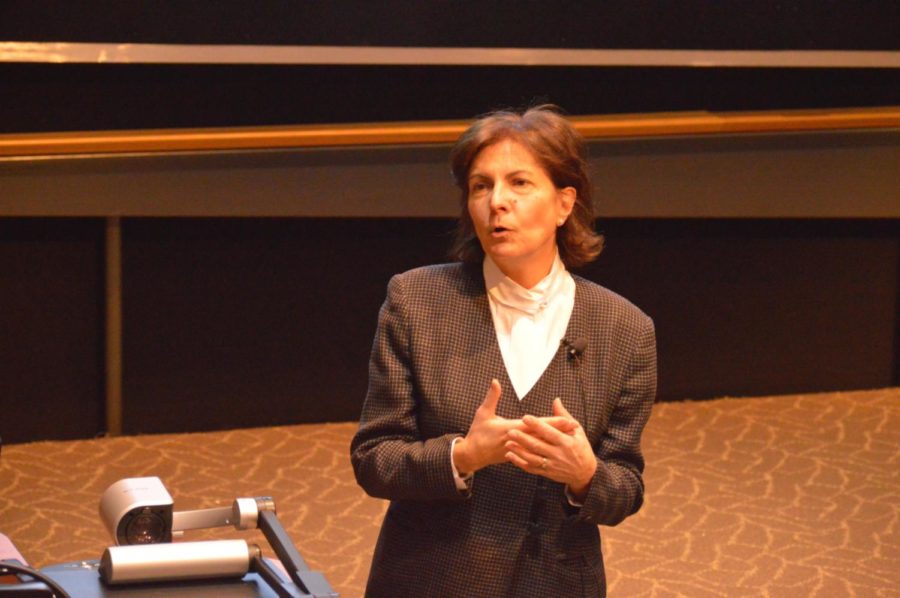Open forums for next engineering dean conclude
April 3, 2019
The candidate forums for the finalists in consideration to be the next James L. and Katherine S. Melsa dean of Iowa State’s College of Engineering have finished. There were five forums where each candidate explained who they were and what they felt they could bring to Iowa State as the next dean. Here is a summary of the candidates.
The first candidate is Janis Terpenny, who is the Peter & Angela Dal Pezzo Chair and dean of the Harold & Inge Marcus Department of Industrial and Manufacturing Engineering at Pennsylvania State University. Terpenny is also the director of the NSF Center for e-Design. During her open forum, Terpenny emphasized the aspects of listening, inclusion and enabling in her approach.
“Students who walk in today are not the same students who walked in yesterday,” Terpenny said. “Are we going to continue operating courses semester-long or are we going to get into modules? It’s all about embracing the changing future ahead of us.”
To help entrepreneurship and innovation, Terpenny discussed the importance of giving students things to be involved with outside of the classroom. To create growth in graduate programs, Terpenny said she would want to create pipeline programs in the College of Engineering. She would also like to increase diversity within the college.
Next is Robert Frosch, senior associate dean of facilities and operations and professor of civil engineering at Purdue University. In his open forum, Frosch covered team building, management and business skills as well as knowledge integration.
“We need students to be prepared for the changing future of work and become the leaders that shape the future,” Frosch said.
Some of the concepts Frosch said he felt were important to moving forward are hands-on experience, real world projects and virtual reality. One of Frosch’s main focuses was the need to enhance education by working on real world problems. Frosch said with the future of research such as artificial intelligence, autonomy, voice interface and energy, it is important students have hands-on experiences.
The third candidate is Erick Jones, an associate dean in the College of Engineering at the University of Texas in Arlington. Jones started his presentation by saying that students, faculty and staff should realize that academics need to be a priority. He presented ideas such as expanding land grants, reforming teaching methods and preparing students from Iowa State to be ready in the workforce.
Jones also introduced the idea of reforming the way students learn in a classroom setting and how he wants to educate the future generation. Jones said there is a difference between actively teaching, rather than passively only using research. He said it is the role of researchers, who also serve as professors, to explain their studies in a way that others can understand.
“It’s one thing to have these great researchers, but if they can’t translate that to the classroom, than we’re missing something,” Jones said.
For students to have a competitive edge when looking for jobs, Jones wants to expand students’ skills such as time management and communication.
The fourth candidate in consideration is W. Samuel Easterling, who is the Montague-Betts professor of structural steel design and head of Virginia Tech’s Via department of civil and environmental engineering.
Easterling said one of his goals is to maintain high quality undergraduate programs in addition to expanding graduate programs. Easterling said he wants to expand the graduate program and research opportunities. To do so, Easterling focused on the need to continue finding greater opportunities for financial support and undergraduate research.
“People are the core, they are our most valuable asset and key to success,” Easterling said.
Easterling earned his doctorate in structural engineering from Iowa State and has earned awards such as the 2012 AISC Special Achievement Award, and the 2017 ASCE Shortridge Hardesty Award.
The fifth and final candidate is Karen Thole from Pennsylvania State University. She earned her bachelor’s and and master’s degrees in mechanical engineering from the University of Illinois and earned her doctorate in mechanical engineering from the University of Texas. Thole is currently a professor at Pennsylvania State and is the head of their department of mechanical engineering.
Thole discussed how she would take Iowa State to the “next level”. She proposed that education and research would help Iowa State do so. Other topics she covered were relevant accomplishments and external drivers in education and research.
Thole said the pressures and cost of schooling is creating a toll on students, and diversity and inclusion is another major issue.
“I want to give a private school feel to a big land grant institution,” Thole said.
Reporting contributed by Megan Nemec, Amber Mohmand and Jordyn Dubois
















